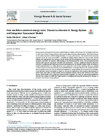How modelers construct energy costs: Discursive elements in Energy System and Integrated Assessment Models
dc.contributor.author
Ellenbeck, Saskia
dc.contributor.author
Lilliestam, Johan
dc.date.accessioned
2018-11-09T11:54:33Z
dc.date.available
2018-11-09T06:04:48Z
dc.date.available
2018-11-09T11:54:33Z
dc.date.issued
2019-01
dc.identifier.issn
2214-6296
dc.identifier.other
10.1016/j.erss.2018.08.021
en_US
dc.identifier.uri
http://hdl.handle.net/20.500.11850/302610
dc.identifier.doi
10.3929/ethz-b-000302610
dc.description.abstract
Energy system and integrated assessment models (IAMs) are widely used techniques for knowledge production to assess costs of future energy pathways and economic effects of energy/climate policies. With their increased use for policy assessment and increasing dominance in energy policy science, such models attract increasing criticism. In the last years, such models – especially the highly complex IAMs, have been accused of being arbitrary. We challenge this view and argue that the models and their assumptions are not arbitrary, but they are normative and reflect the modelers’ understanding of the functioning of the society, the environment-societal relations and respective appropriate scientific tools and theories – in short: models are shaped by discursive structures, reproducing and reinforcing particular societal discourses. We identify 9 distinct paths, all relating to crucial model decisions, via which discourses enter models: for each of these decisions, there are multiple “correct” answers, in the sense that they can be justified within a particular discourse. We conclude that decisions of modelers about the structure and about assumptions in energy modeling are not arbitrary but contingent to the discursive context the modeler is related to. This has two implications. First, modelers and consumers of model output must reflect on what a model and its assumptions represent, and not only whether are they correct. Second, models hardly need to add more (mathematical) complexity, but rather be reduced and simplified so that they can continue to fulfill their main function as formalized and powerful instruments for thought experiments about future energy pathways.
en_US
dc.format
application/pdf
dc.language.iso
en
en_US
dc.publisher
Elsevier
en_US
dc.rights.uri
http://creativecommons.org/licenses/by-nc-nd/4.0/
dc.subject
Energy models
en_US
dc.subject
Integrated assessment models
en_US
dc.subject
Discourses
en_US
dc.subject
Constructivism
en_US
dc.subject
SKAD
en_US
dc.title
How modelers construct energy costs: Discursive elements in Energy System and Integrated Assessment Models
en_US
dc.type
Journal Article
dc.rights.license
Creative Commons Attribution-NonCommercial-NoDerivatives 4.0 International
dc.date.published
2018-09-07
ethz.journal.title
Energy Research & Social Science
ethz.journal.volume
47
en_US
ethz.pages.start
69
en_US
ethz.pages.end
77
en_US
ethz.version.deposit
publishedVersion
en_US
ethz.grant
The transition to a renewable electricity system and its interactions with other policy aims
en_US
ethz.identifier.wos
ethz.identifier.scopus
ethz.publication.place
Amsterdam
en_US
ethz.publication.status
published
en_US
ethz.leitzahl
ETH Zürich::00002 - ETH Zürich::00012 - Lehre und Forschung::00007 - Departemente::02350 - Dep. Umweltsystemwissenschaften / Dep. of Environmental Systems Science::02723 - Institut für Umweltentscheidungen / Institute for Environmental Decisions::09617 - Lilliestam, Johan (ehemalig) / Lilliestam, Johan (former)
ethz.leitzahl
ETH Zürich::00002 - ETH Zürich::00012 - Lehre und Forschung::00007 - Departemente::02350 - Dep. Umweltsystemwissenschaften / Dep. of Environmental Systems Science::02723 - Institut für Umweltentscheidungen / Institute for Environmental Decisions::09617 - Lilliestam, Johan (ehemalig) / Lilliestam, Johan (former)
ethz.leitzahl.certified
ETH Zürich::00002 - ETH Zürich::00012 - Lehre und Forschung::00007 - Departemente::02350 - Dep. Umweltsystemwissenschaften / Dep. of Environmental Systems Science::02723 - Institut für Umweltentscheidungen / Institute for Environmental Decisions::09617 - Lilliestam, Johan (ehemalig) / Lilliestam, Johan (former)
ethz.leitzahl.certified
ETH Zürich::00002 - ETH Zürich::00012 - Lehre und Forschung::00007 - Departemente::02350 - Dep. Umweltsystemwissenschaften / Dep. of Environmental Systems Science::02723 - Institut für Umweltentscheidungen / Institute for Environmental Decisions::09617 - Lilliestam, Johan (ehemalig) / Lilliestam, Johan (former)
ethz.grant.agreementno
715132
ethz.grant.fundername
EC
ethz.grant.funderDoi
10.13039/501100000780
ethz.grant.program
H2020
ethz.date.deposited
2018-11-09T06:04:50Z
ethz.source
SCOPUS
ethz.eth
yes
en_US
ethz.availability
Open access
en_US
ethz.rosetta.installDate
2018-11-09T11:54:58Z
ethz.rosetta.lastUpdated
2023-02-06T16:34:50Z
ethz.rosetta.versionExported
true
ethz.COinS
ctx_ver=Z39.88-2004&rft_val_fmt=info:ofi/fmt:kev:mtx:journal&rft.atitle=How%20modelers%20construct%20energy%20costs:%20Discursive%20elements%20in%20Energy%20System%20and%20Integrated%20Assessment%20Models&rft.jtitle=Energy%20Research%20&%20Social%20Science&rft.date=2019-01&rft.volume=47&rft.spage=69&rft.epage=77&rft.issn=2214-6296&rft.au=Ellenbeck,%20Saskia&Lilliestam,%20Johan&rft.genre=article&rft_id=info:doi/10.1016/j.erss.2018.08.021&
Files in this item
Publication type
-
Journal Article [128832]

